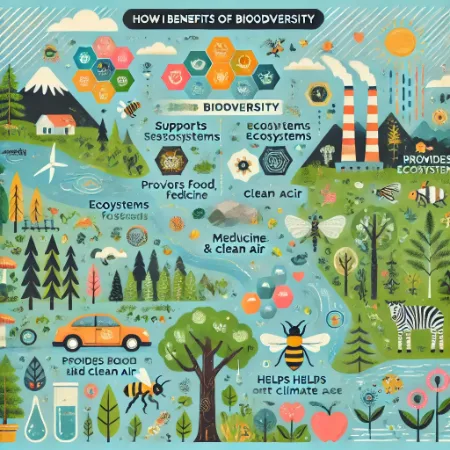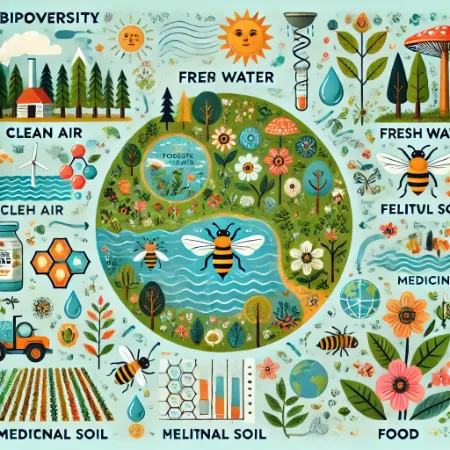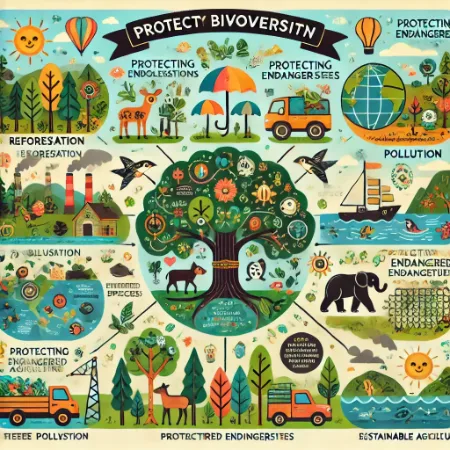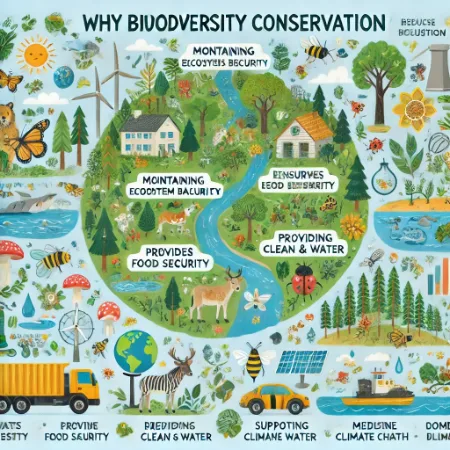What is Biodiversity? It refers to the variety of all living species in nature. It also maintains ecosystem balance and supports sustainability. Therefore, genetic, species, and ecosystem diversity are vital elements of biodiversity. In this way, species adapt more easily to environmental changes. It also significantly contributes to agriculture, medicine, and industry. In this case, natural resources are used efficiently. Therefore, it improves water, air, and soil quality. It also plays a key role in combating climate change. In this way, ecosystem services continue without disruption. What is Biodiversity highlights why deforestation and pollution must be prevented. Furthermore, harmful hunting and agricultural chemicals threaten biodiversity. This puts countless species at extinction risk. Therefore, strong conservation policies should be implemented. In addition, natural habitats need protection through environmental awareness. In this way, a healthy planet can be left to future generations.
Table of Contents
- Importance and Benefits of Biodiversity
- Benefits of Biodiversity
- Biodiversity Conservation
- Why Biodiversity Conservation is Important
- Conclusion
- Frequently Asked Questions
Importance and Benefits of Biodiversity

Biodiversity is the most important factor that maintains the health and balance of ecosystems. It also ensures the sustainability of natural cycles and supports ecosystem services. Therefore, it plays a major role in maintaining air, water and soil quality. In this way, human health and agricultural productivity are positively affected. Furthermore, plant and animal species contribute to economic activities. In this case, sectors such as pharmaceuticals, food and textiles benefit from biodiversity. Therefore, the conservation of natural resources is also important for economic stability. Furthermore, forests and wetlands support carbon absorption. In this way, they play a critical role in combating climate change. Therefore, a reduction in biodiversity makes ecosystems vulnerable. Furthermore, the disruption of ecosystem balance negatively affects food production. In this case, the protection of natural habitats becomes a necessity.
Benefits of Biodiversity

Biodiversity is critical for the sustainability of ecosystems and maintaining the balance of nature. It also ensures efficient agricultural production and supports food security. Therefore, different plant species increase soil fertility and prevent erosion. In this way, the water cycle is maintained and clean water sources are sustained. Furthermore, forests and marine ecosystems play a role in combating climate change by absorbing carbon. This improves air quality and reduces the effects of global warming. Therefore, biodiversity also helps to mitigate the impact of natural disasters. Furthermore, many plant and animal species are important for medical discoveries. In this way, the pharmaceutical and health sectors benefit greatly from biodiversity. Therefore, the resources offered by nature contribute to economic development. Furthermore, maintaining ecosystem balance supports sustainable tourism. In this case, the protection of natural habitats becomes a necessity.
Biodiversity Conservation

Conservation of biodiversity is crucial for the sustainability of ecosystem balance. Furthermore, the destruction of natural habitats jeopardizes the extinction of species. Therefore, habitat destruction and deforestation must be prevented. In this way, biodiversity can be preserved by ensuring the continuity of ecosystems. Furthermore, unconscious hunting and illegal trade threaten many species. In this case, strict controls are necessary to protect wildlife. Therefore, natural parks and protected areas should be increased. Furthermore, reducing the use of chemicals in agriculture supports biodiversity. This way, soil and water resources remain healthier. Therefore, sustainable agriculture and organic production should be promoted. Furthermore, raising environmental awareness provides social support. In this case, education and awareness-raising efforts play a major role. Therefore, recycling and waste management protect ecosystems. Furthermore, the use of renewable energy sources reduces environmental impacts.
Why Biodiversity Conservation is Important

Conservation of biodiversity is essential for the sustainability of ecosystems and the maintenance of natural balance. Moreover, the degradation of ecosystems directly affects human life. Therefore, food production and clean water resources are at risk. In this way, sectors such as agriculture and fisheries can suffer. Furthermore, the decline in plant and animal species negatively affects natural cycles. In this case, the impacts of climate change can be exacerbated. Therefore, deforestation and pollution must be brought under control. Furthermore, overconsumption of natural resources threatens biodiversity. In this way, species extinction leads to a deterioration in ecological balance. Therefore, the continuity of ecosystem services must be ensured. Furthermore, the decline in biodiversity can cause economic losses. In this case, the agriculture, pharmaceutical and tourism sectors are negatively affected. Therefore, conservation policies and sustainable practices should be implemented.
Conclusion
What is biodiversity? Biodiversity is the variety of living things that ensures the healthy functioning of ecosystems. It plays a critical role in sustaining natural cycles. Therefore, maintaining environmental balance depends on biodiversity. In this way, agriculture, water resources, and climate stability are preserved. Furthermore, biodiversity mitigates natural disasters and ensures ecosystem services continue. A decline in biodiversity directly impacts human life. What is biodiversity? Biodiversity is vital for sustaining nature’s ecosystem services. Species extinction disrupts the food chain, leading to economic and ecological imbalance. Therefore, individuals and societies must act responsibly and adopt sustainable habits. Thus, natural resources can be preserved for future generations. Education and awareness should increase, and legal regulations should support biodiversity protection. What is biodiversity? Biodiversity is an indispensable natural heritage for humanity’s future.
Frequently Asked Questions
Why should biodiversity be protected? It should be protected because it preserves the natural balance and improves ecosystems and people’s living conditions.
What problems can a decrease in biodiversity cause? It can lead to climate change, food crises, depletion of water resources and ecosystem collapse.
How does biodiversity contribute to the health sector? Many medicines are derived from plant sources, enabling the discovery of new treatment methods.
How does biodiversity combat climate change? Forests and marine ecosystems absorb carbon, reducing the effects of global warming.
How does deforestation affect biodiversity? It causes habitat loss, leading to the extinction of many plant and animal species.
How do pesticides affect biodiversity? They pollute soil and water resources, threatening the health of living species.
What can individuals do to help protect biodiversity? They can contribute by recycling, adopting conscious consumption habits, and using environmentally friendly products.
What is the relationship between sustainable development and biodiversity? Conservation of natural resources ensures that economic development continues in a sustainable manner.
How does urbanization affect biodiversity? The habitat of many species shrinks due to the decrease in green areas and environmental pollution.
How can individuals contribute to the conservation of biodiversity in their daily lives? They can contribute by choosing natural products, saving water and reducing the use of plastic.







